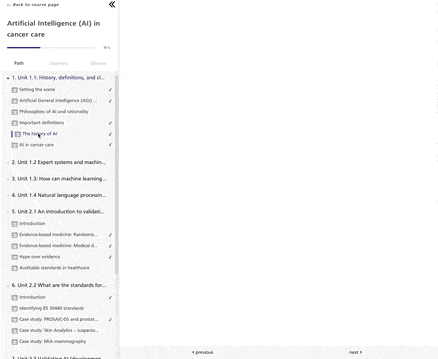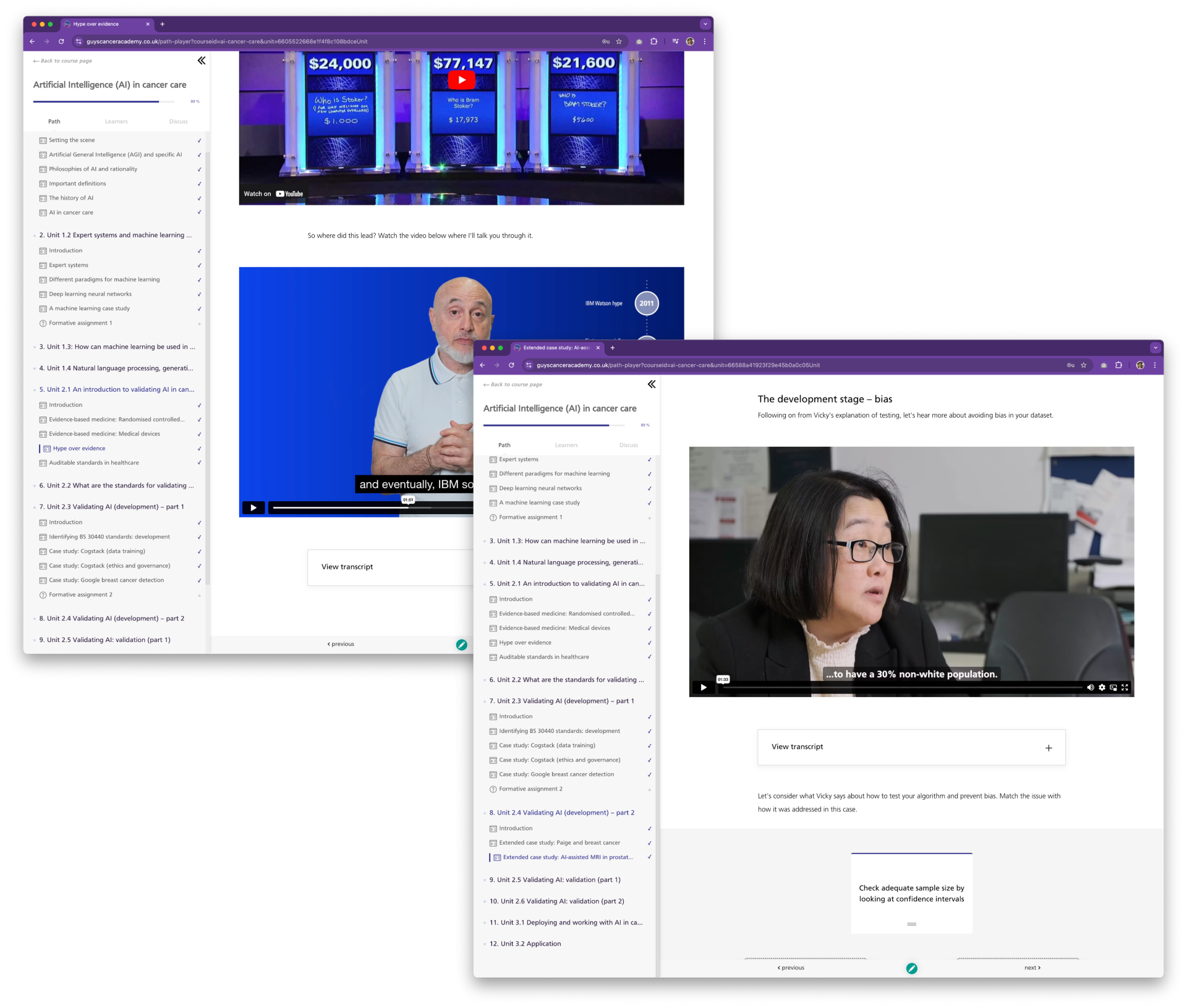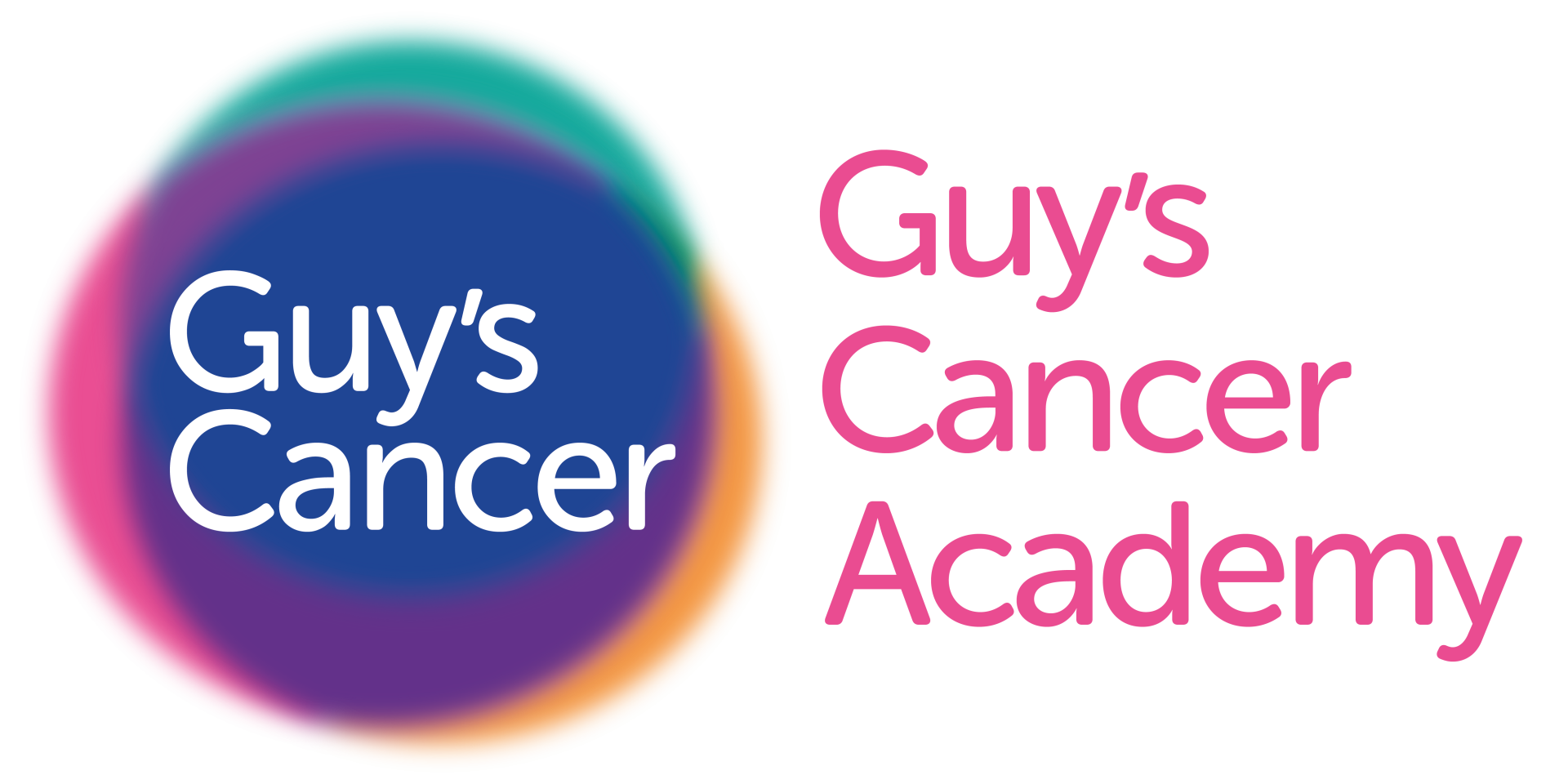Artificial Intelligence (AI) in cancer care online course

Course contents
Our course will equip you with the knowledge and skills to confidently evaluate, validate, and integrate AI technologies into real-world cancer settings. Take a look at our curriculum in more detail below:
Core concepts
Learn key definitions, trace AI’s evolution from the 1950s to today, and distinguish between types of AI, including rule-based expert systems, supervised and unsupervised machine learning, and neural networks.
How AI systems work
We break down how expert systems like Deontics’ PROSAIC-DS support prostate cancer decisions; understand neural networks via a brain cancer prediction tool; and build your understanding of model training without needing advanced maths.
Learn about natural language processing and LLMs in healthcare
Understand how tools like Cogstack extract meaning from unstructured clinical notes, and see how large language models (like Google DeepMind’s ELIXR) are being developed for summarising complex patient data and supporting multimodal clinical reasoning.
Evidence and ethics
Explore how AI products are evaluated for clinical and cost-effectiveness, compare this to traditional interventions, and learn to spot hype using real-world examples.
Use the BS 30440 standard to assess AI at each stage of development
Understand how this comprehensive British Standard provides a framework for designing safe, effective, and ethically sound AI systems in healthcare. You’ll explore what good practice looks like at every stage, from scoping the clinical problem and involving end users, to defining success criteria and aligning with regulatory expectations.
Through detailed case studies, you’ll examine how each product:
- Identified a clear clinical need and designed with real-world healthcare settings in mind.
Through detailed case studies, you’ll examine how each product:
- Identified a clear clinical need and designed with real-world healthcare settings in mind.
- Actively involved clinicians and patients in early design and development.
- Applied the relevant sections of BS 30440 to guide safety, usability, and evidence generation.
Learn how AI tools are validated in the real world
Assess how effectiveness, bias, and equity are measured. Identify barriers to implementation, such as integration into NHS workflows, clinician acceptance, and governance hurdles. Explore practical solutions in action.
Explores national validation frameworks
The second half of this course is built around understanding and applying the British Standard 30440 to validate AI systems in healthcare settings. A personal licensed copy of the standard is also included in your fee, which is worth £258.
Write your awesome label here.
Driven by clinical case studies
What we cover
Course lead
Dr Danny Ruta
Danny is AI Clinical Lead for the Guy’s Cancer Centre, and co-founder and clinical, education and training lead for PharosAI, a joint venture between Guy’s and St Thomas NHS Foundation Trust, King’s College London, Bart’s NHS Trust and Queen Mary’s University London.
Danny has led on several AI clinical evaluations in cancer care, including AI for clinical decision support, clinical trials matching and histopathology diagnosis.
Danny has led on several AI clinical evaluations in cancer care, including AI for clinical decision support, clinical trials matching and histopathology diagnosis.
Write your awesome label here.
Write your awesome label here.
Ready to apply?
Watch. Read. Discuss. Interact. Improve.
Bite-sized interactive video lectures
Short, sharp videos with animations, graphics and exercises to explain key concepts clearly
Case studies and interviews
We bring topics to life with interactive case studies and interviews with experts in their field.


Live classes and tutorials
This course features three live sessions to provide a space ask questions and work on activities together.
Feedback and support
Our course team provides tailored feedback on all of your assignments and contributions.
What learners on this course say
A thorough and engaging journey through AI in cancer care, from birth of the technology to today. Insightful discussion, useful case studies, a real eye opener to the AI colleague we will all seemingly all work with in the future.
This AI course has deepened my understanding of how AI works and its potential in cancer clinical practice. I’ve gained valuable insights into different AI models, how they are developed, and how they can be validated and applied in healthcare settings.
Excellent grounding in AI to enable a thorough understanding of the applications, including the hype and benefits realisation.
Frequently asked questions
How much does the AI course cost, and what is included in the cost?
Student fees are £1,400 and included within these fees are:
- access to our online platform and course tutors
- all required materials
- three interactive live sessions on Zoom
- an individual licensed copy of the BS 30440 standards for the validation of AI in healthcare to use in practice settings.
Is a Purchase Order number necessary?
To guarantee a place on any of our courses, the submitted application form will need to be accompanied by a valid Purchase Order (PO) number.
Self-funding applicants do not need to submit a PO number, but the raised invoice will need to be paid before the commencement of the course.
If a valid PO number is not received within one month before the course starts, we will defer your enrolment until the next cohort or until we have received a PO number.
Self-funding applicants do not need to submit a PO number, but the raised invoice will need to be paid before the commencement of the course.
How much time do I need?
It takes 125 hours to complete the online course, and we'd expect learners to find at least four hours per week for study.
There was some information missing in my application form. Does this matter?
A submitted incomplete application form will need to have all information completed in order to secure a place on any of our courses.
Our course administrator will be in touch to advise if any information is missing.
Our course administrator will be in touch to advise if any information is missing.
Ready to apply?
The course runs for 14 weeks
